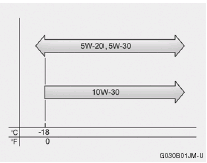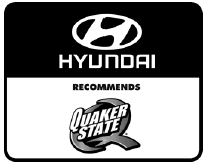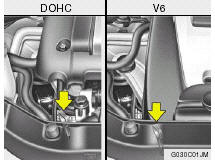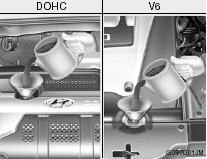Checking the engine oil
Engine oil is essential to the performance and service of the engine. It is suggested that you check the oil level at least once a week in normal use and more often if you are on a trip or driving in severe conditions.

Recommended Oil
The engine oil quality should meet the following classification.
API SJ, SL or ABOVE, ILSAC GF-3 or ABOVE
NOTE:
o For good fuel economy, SAE 5W-20 (5W-
30), ILSAC GF-3 engine oil is preferred
regardless of regional option and engine
variation.
o If SAE 5W-20, ILSAC GF-3 engine oil is not available, secondary recommended engine oil for corresponding temperature range can be used.


To Check the Oil Level
Before checking the oil, warm up the engine to the normal operating temperature and be sure your car is parked on level ground. Turn the engine off.
Wait five minutes , then remove the dipstick, wipe it off, fully reinsert the dipstick and withdraw it again. Then note the highest level the oil has reached on the dipstick. It should be between the upper ("FULL") and lower ("LOW") range.
WARNING:
Be very careful not to touch the radiator
hose when checking the engine oil as it may
be hot enough to burn you.

Adding Oil
If the oil level is close to or below the "L" mark, add oil until it reaches the "F" mark. To add oil: 1. Remove the oil filler cap by turning it counterclockwise.
2. Add oil, then check the level again. Do not overfill.
3. Replace the cap by turning it clockwise.
The distance between the "F" and "L" marks is equal to about 1 quart of oil.
WARNING:
Be very careful not to touch the radiator
hose when adding the engine oil as it may
be hot enough to burn you.
See also:
2010 Hyundai Genesis Coupe review By Kristin Varela
Before my two-week test drive of the 2010 Hyundai Genesis coupe, I had
fantasies of becoming the top U.S. female drifter, Verena Mei, while sitting
behind the Genesis coupe's steering wheel. It's ...
Instrument cluster and indicator lights
1. Tachometer.
2. Turn Signal Indicator Light.
3. Seat Belt Warning Light.
4. Supplemental Restraint (AirBag) System Service Reminder Indicator (SRI).
5. Speedometer.
6. Parking Brake/Low Brake ...
Air bag warning light
The purpose of air bag warning light in your instrument panel is to alert you
of a potential problem with your air bag - Supplemental Restraint System (SRS).
When the ignition switch is turned ON ...


